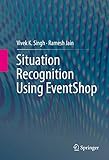Situation Recognition Using EventShop [electronic resource] / by Vivek K. Singh, Ramesh Jain.
By: Singh, Vivek K [author.].
Contributor(s): Jain, Ramesh [author.] | SpringerLink (Online service).
Material type: BookPublisher: Cham : Springer International Publishing : Imprint: Springer, 2016Description: XVII, 140 p. 79 illus., 75 illus. in color. online resource.Content type: text Media type: computer Carrier type: online resourceISBN: 9783319305370.Subject(s): Computer science | Multimedia information systems | User interfaces (Computer systems) | Computer Science | Multimedia Information Systems | User Interfaces and Human Computer InteractionAdditional physical formats: Printed edition:: No titleDDC classification: 006.7 Online resources: Click here to access online
BookPublisher: Cham : Springer International Publishing : Imprint: Springer, 2016Description: XVII, 140 p. 79 illus., 75 illus. in color. online resource.Content type: text Media type: computer Carrier type: online resourceISBN: 9783319305370.Subject(s): Computer science | Multimedia information systems | User interfaces (Computer systems) | Computer Science | Multimedia Information Systems | User Interfaces and Human Computer InteractionAdditional physical formats: Printed edition:: No titleDDC classification: 006.7 Online resources: Click here to access online Introduction -- Understanding and Using Situations -- Related Work on Situation Recognition -- Overall Framework for Situation Recognition: Overview -- Situation Modeling -- Data Representation and Situation Recognition Operators -- EventShop: System Architecture -- Using EventShop -- Case Studies: Using EventShop for Creating Multiple Situation Recognition Applications -- Research Directions: Challenges and Opportunities.
This book presents a framework for converting multitudes of data streams available today including weather patterns, stock prices, social media, traffic information, and disease incidents into actionable insights based on situation recognition. It computationally defines the notion of situations as an abstraction of millions of data points into actionable insights, describes a computational framework to model and evaluate such situations and presents an open-source web-based system called EventShop to implement them without necessitating programming expertise. The book is useful for both practitioners and researchers working in the field of situation-aware computing. It acts as a primer for data-enthusiasts and information professionals interested in harnessing the value of heterogeneous big data for building diverse situation-based applications. It also can be used as a reference text by researchers working in areas as varied as database design, multimodel concept recognition, and middle-ware and ubiquitous computing to design and develop frameworks that allow users to create their own situation recognition frameworks.


There are no comments for this item.